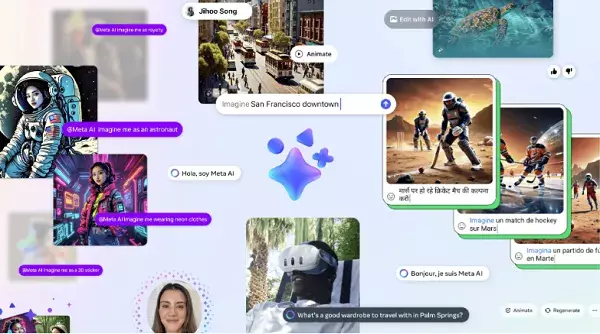Meta’s recent announcement of expanding its Meta AI chatbot to seven more languages and regions is undoubtedly a bold move. However, it raises questions about the actual popularity and utility of the chatbot versus its widespread presence due to Meta’s existing user base. The addition of new languages and regions may increase accessibility, but it remains to be seen whether this expansion truly reflects user demand or simply Meta’s strategic positioning in the AI market.
The introduction of new creative functions within the chatbot, such as the ability to generate AI images based on user prompts, seems innovative at first glance. However, the comparison to Snapchat’s “Dreams” functionality raises concerns about the longevity and novelty of such features. While these additions may attract initial user interest, the sustainability of user engagement with AI-generated content remains uncertain.
On the surface, the introduction of editing tools for generative AI images appears to address a common concern with AI-generated content – the lack of customization options. The ability to refine and adjust AI images directly within the chat stream may enhance user experience and creativity. Yet, the practical implications of these editing tools in terms of user engagement and artistic expression warrant closer scrutiny.
One of the most pressing concerns raised by Meta’s AI development plan is the potential dilution of the human element in social media interactions. By encouraging users to engage with AI-generated content and prompts, Meta risks overshadowing the authentic and connective aspects of social media engagement. The shift towards AI-driven interactions may compromise the essence of interactive communities and human-to-human communication that defined the original appeal of social platforms.
Meta’s introduction of a new option for users to choose their preferred AI model for different tasks acknowledges the need for flexibility and customization in AI interactions. While this technical feature may cater to users with specific preferences or requirements, its practical relevance and widespread adoption remain uncertain. The complexity of navigating AI model settings may limit the appeal and accessibility of this feature to the average user.
The beta launch of Meta AI in VR represents a significant advancement in the application of AI tools for immersive experiences. By integrating AI capabilities into VR environments, Meta aims to revolutionize the creation and interaction with virtual worlds. The potential for users to generate VR experiences through simple text prompts signals a new era of user-driven content creation and personalization in virtual reality.
While the current developments in Meta’s AI expansion plan demonstrate incremental progress and innovation, the ultimate test lies in the long-term adoption and impact of these features. The overarching goal of habituating users to engage with AI tools through chat prompts hints at a broader vision for future digital interactions. As Meta continues to refine its AI capabilities and expand its reach across different platforms, the evolution of AI-driven experiences may reshape the fundamental dynamics of online engagement and communication.
Meta’s ambitious AI development plan highlights both the promise and pitfalls of integrating AI technologies into everyday interactions. While the expansion of Meta’s AI chatbot and creative functions showcases innovation and experimentation, the underlying challenges of maintaining human connection and authenticity in digital interactions remain critical. As Meta navigates the complexities of AI integration and user engagement, the future trajectory of AI-powered experiences in VR and social media will ultimately determine the success and sustainability of Meta’s AI development efforts.


Leave a Reply
You must be logged in to post a comment.